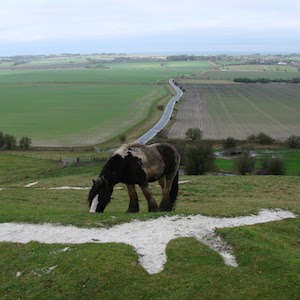Location, location, location is England’s unofficial motto, and obsession over place has left a well-worn groove in Britain’s annals of alternative expression. A desire to mark out territory as a means to influence or affect through art is prevalent in Derek Jarman’s The Last of England, filmed in ‘Enterprise’-afflicted Docklands; Jonathan Meades’ studious, stiff-suited barks to camera from Aberdeen to Portland; Laura Oldfield Ford’s expressionistic depictions of UK urbanism that form a singular solidarity; and Patrick Keiller’s Robinson trilogy that invented a fictional character who provides a kind of allegory of England – a sick man falling out of existence via the Thames Estuary and suburban Oxfordshire.
Way Through worked with Patrick Keiller last year as part of his Tate Britain residency, and the duo fit neatly into the same vein of English resistance through obsessive mapping. Each song on Clapper Is Still is steeped in the place that inspired and named it, via field recordings and lyrical observation. Yet Way Through’s third album is no stuffy, hemmed-in experience, unlike much of what is collectively referred to as ‘psychogeography’ today. This is an emotionally charged topographical tapestry, a wild and free evocation of a deeply personal England, born as much out of inebriated excursions as archive digging.
The duo is billed as pastoral punk, and it just about fits; Christopher Tipton (guitar, vocals) and Claire Titley (percussion, vocals) grew up in Shropshire but entered music through helping shake up London’s live scene with the roughshod experimentalism of American DIY music via the collective they founded, Upset the Rhythm. They invited Deerhoof, Liars, Ariel Pink, John Maus and others to play some of their first UK shows, and you can hear the traces of these (and the melodic, atmospheric punk tradition of such US guitar bands as Mission of Burma, Fugazi, Minutemen et al) mingling with a stream of experimental sound collages – running water, a frenzied crowd, children, birdsong, gun shots – and the hypnotic tropes of British folk music.
Opening track ‘Dedham Vale’ leans heavily on the latter, a reverent commentary on Constable Country on the inauthentic nature of rubber-stamped rurality on the Essex-Suffolk border, while the song that follows, ‘Imber & Tyneham’, articulates the furious contrasts between two MOD-owned villages through restless guitar and drums that segue into a burst of church bells.
‘Stoke Poges’ is a sublime tumble between tranquil, abstract noise and the poetic evocation of springtime, which manages a subtle dig at John Betjeman’s disdain of a certain Berkshire town: "It’s rural aspect frozen in time / Eight minutes from Slough bus station line". Titley evokes the collisions of Civil War remembrance and suburban survivals over guitar and white-soul backing from Tipton on ‘Westzoyland’ and later conjures a scintillating reverie, shaking out the plague-marked past of the suburbanised Derbyshire village Eyam, that is currently experiencing a new affliction of "heritage stasis".
To point artistic effort toward place is inherently political, which is where the ‘punk’ bit comes in here. It reclaims a location’s importance and potential in the face of the banal destruction of property development and price rises. "It’s time to leave, and get used to not returning," Tipton ends track number four, ‘Roughting Linn’, a dazzling evocation of landscape via clear-eyed lyrical observation and hypnotic guitar and drums. The lyric marks the album out as an exploration of the ambiguities of memory and the tragedy of change, born out of the duo’s witnessing of the unforgiving pace of east London regeneration, as much as their forays into Britain’s hallowed and forgotten backwaters.


